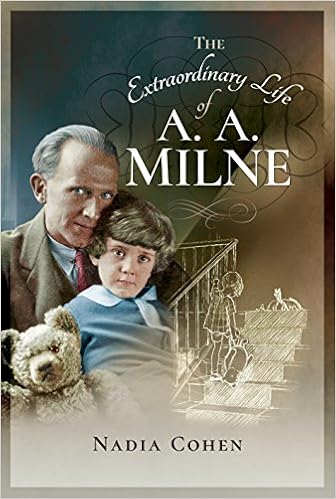
AA Milne memoir shows Winnie-the-Pooh author longing to 'escape' his bear
It’s Too Late Now, being republished after 70 years, reveals a writer frustrated at the eclipse of his work for adults by runaway success of children’s books

Trapped … AA Milne with his son Christopher Robin and one of Pooh’s forebears in 1926. Photograph: Alamy
Winnie-the-Pooh may have secured a place in the hearts of children worldwide and made his creator a millionaire, but author AA Milne resented the way the bear of little brain undermined his reputation as a serious writer.
The revelation appears in his 1939 memoir It’s Too Late Now, which is to be republished on 21 September, 70 years after it went out of print and ahead of the release of a biopic about his son, Goodbye Christopher Robin. Despite the success of Pooh, Piglet, Tigger and friends, Milne was frustrated that his reputation as a writer for adults had been irrevocably damaged.
Prior to his children’s books, Milne had written a string of hit plays, novels and short stories for adults, as well as editing the satirical magazine Punch. But his first book of children’s verse, When We Were Very Young, sold 50,000 copies within two months of publication in 1924 and his Winnie-the-Pooh books became immediate bestsellers around the world. When the first volume Winnie-the-Pooh was published in 1926, it sold 150,000 copies by the end of the year in the US alone. It has never been out of print since.
In It’s Too Late Now, Milne claims that he had tired of children’s writing after 70,000 words (“the number of words in the average-length novel”), but was trapped. “I wanted to escape from [children’s books] as I had once wanted to escape from Punch; as I have always wanted to escape,” he writes. “In vain. England expects the writer, like the cobbler, to stick to his last.”
In one waspish passage, to which today’s bestselling authors would no doubt relate, Milne adds: “It is inevitable that a book that has had very large sales should become an object of derision to critics and columnists.” In a swipe at literary snobs, he adds: “We all write books, we all want money: we who write want money from our books. If we fail to get money, we are not so humble, nor so foolish, as to admit that we have failed in our object. Our object, we maintain, was artistic success.”
The book also reveals a fraught relationship with literary critics. In his sights was the famously acid critic Dorothy Parker, writing as the Constant Reader for the New Yorker. The House at Pooh Corner resulted in one of Parker’s most famous putdowns: “Tonstant Weader Fwowed up”.
Milne was stung and traded back: “However greatly indebted to Mrs Parker, no Alderney, at the approach of the milkmaid, thinks ‘I hope this lot will turn out to be gin’, no writer of children’s books says gaily to his publisher, ‘Don’t bother about the children, Mrs Parker will love it’.”
The memoir also shows that Milne appeared blithely unaware of the negative impact the Pooh books had on his son, Christopher Robin, who became estranged from his father later in life.

The real Winnie-the-Pooh revealed to have been 'Growler'
Recalling that his son referred to himself as “Billy Moon”, Milne writes: “I mention this because it explains why the publicity that came to be attached to ‘Christopher Robin’ never seemed to affect us personally, but to concern either a character in a book or a horse that we hoped at one time would win the Derby.”
However, Christopher Robin was mercilessly bullied at school because of Winnie-the-Pooh, later claiming to Giles Brandreth that Milne “had got where he was by climbing on my infant shoulders, that he had filched from me my good name and had left me with nothing but the empty fame of being his son.”
Harriet Sanders, who is republishing the memoir for Macmillan’s imprint Bello, said it revealed Milne to be more complex than many assume. “People think they know him, but the memoir reveals that though he is very famous, we hardly know anything about him,” she said.
Bello, which revives out-of-print titles, is publishing the memoir alongside seven of Milne’s other lesser known works, including a 1921 novel based on his 1919 play Mr Pim Passes By, a comedy of errors set in a grand home in Buckinghamshire; a 1933 murder mystery called Four Days of Wonder, which follows an enthusiastic teenage girl detective; and Birthday Party & Other Stories, a collection of 15 short stories that was first published in 1948.
No comments:
Post a Comment